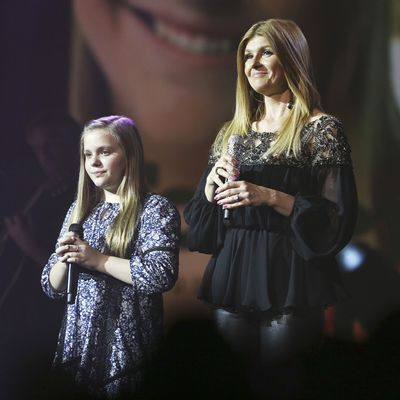

Come see Connie Britton at this year’s Vulture Festival on Saturday, May 20, at 1 p.m. in New York. Tickets available on VultureFestival.com!
It was in season one that Nashville came closest to being its best self. The show was set up as an insiderish look at the country music industry in Nashville, focusing on the rivalry between two stars: Rayna James (Connie Britton), a Reba McIntyre-style country legend who worried that her most popular days were behind her, and the Taylor Swift-like Juliette (Hayden Panettiere), a rising country-pop star who would do anything to get ahead. Rayna was earthy and warm with a nice (if dull) husband and two talented daughters. Juliette — who grew up in a trailer park with her addict mother — was a sharp-tongued diva who secretly yearned to be loved. There were other main players in their orbit: dreamy but tortured guitarist Deacon (Charles Esten), a recovering alcoholic and Rayna’s one true love; talented aspiring artists (and future lovebirds) Scarlett (Claire Bowen) and Gunnar (Sam Palladio); Will (Chris Carmack), the good ol’ boy singer who was a closeted gay man; Teddy (Eric Close), who was Rayna’s husband and a character so boring, they eventually just sent him to prison; and Jonathan Jackson’s bad boy Avery (yes, Avery was once a bad boy), a singer-songwriter who sold out his bandmates for fame, but was later humbled and refashioned as a romantic lead. The show had the cachet of famed music director T Bone Burnett, a convincing sense of place (the Bluebird Café, y’all!), and seemed to understand the ongoing struggle to remain an authentic artist in a social-media-driven world.
We Friday Night Lights fans already knew how fantastic Connie Britton is (her hair alone inspired a cult-like following), but Panettiere was the real revelation here. She rattled off Juliette’s sauciest one-liners with relish, but she never let us forget her vulnerable side, either. Better still, the girl could sing! Indeed, with the exception of Britton, who had a serviceable voice at best (but the acting chops to compensate), all the main cast had wonderful voices, with Bowen and Palladio as standouts. (Later, Rayna’s daughters, played by real-life sister act Lennon and Maisy, would perform, and their perfectly harmonized duets would melt everyone’s hearts.)
But even in that first season there were some obvious chinks in the armor. There was a whole, unnecessary side plot involving Rayna’s father (Powers Boothe), a corrupt developer, and his various political gambits. And we began to see the emergence of Nashville’s famous filler characters — or “randos” as The New Yorker’s Emily Nussbaum dubbed them on Twitter — who popped up for an episode or two, usually as an artificial romantic foil or some other kind of deus ex machina, but were almost never interesting, memorable, or convincingly integrated into the plot.
There are some shows that are great at getting you to be emotionally invested in new characters (I cared about The Good Wife’s Lucca, played by Cush Jumbo, from day one). Nashville was the opposite. They couldn’t even make us care about interesting actors. It took well over a year for anyone to give a whit about country music superstar Luke Wheeler, despite the fact that he was played by the charming and talented Will Chase. They totally wasted the divine Laura Benanti, who was less a character and more a PSA for spousal abuse. The Fugees’ Wyclef Jean showed up briefly, I think — unless I dreamt it — as a music producer who encouraged Avery to sell out. There was Scarlett’s evil mother (and Deacon’s sister) Beverly (Dana Wheeler-Nicholson), who seemed to be introduced to the series just so she could one day die. In the final season, there was a bizarre father and daughter duo who were hellbent on bringing down Deacon and Rayna, for no apparent reason. And those are just the characters who stuck around for a while: There was a seemingly endless array of roadies and veterinarians and magical homeless people and sober coaches and runaways, who came on to the show briefly, made zero impact, and left.
By season two, T Bone Burnett was gone, and while the music was still very good, it was never as good (season one’s “If I Didn’t Know Better,” sung by Gunnar and Scarlett, remains the best song of the show’s run), and Nashville was already beginning to lose its way. As the seasons went on, there was less focus on the music and the music industry and more focus on hook-ups and scandals and betrayals. The plotlines got soapier — drunken car crashes! fake pregnancies! murder! — and more convoluted.
Again and again, it seemed that Nashville didn’t play to its strengths — the frenemy-like relationship between Rayna and Juliette (by the final season, they barely had any scenes together), the industry dish, and the music. The show did such a bang-up job of establishing its main “ships” — Deacon and Rayna, Scarlett and Gunnar, Juliette and Avery — that no threats to those relationships ever seemed credible. Deacon, in particular, had a whole slew of girlfriends, not one whose name I can remember.
And then, I hate to say it, perhaps because of its strict adherence to soap opera tropes, Nashville had a bit of a female problem, so to speak. Wednesday’s finale, for example, had no less than four women who got their deserved comeuppance, in ways that were supposed to inspire maximum schadenfreude. The jealous rival, the scheming bitch, the woman who would do anything to keep her man (for peak crazy: see Peggy’s fake pregnancy and pig’s blood miscarriage in season two), were all stereotypes the show freely trafficked in. And in the final episode, it was Deacon who heroically saved the day — rescuing his daughter from the clutches of a predator — when it should’ve been Rayna, the fiercest mama of them all.
And yet, there was something about the show that made it impossible to quit — partly because when it was good, it was very good. The cast really was exceptional (and exceptionally likable, both onscreen and off), the music was fun (I’ve heard several people say it gave them an appreciation for country music they’d never had before), and there was even a wholesome, jamboree-like tour! I made some fun of Claire Bowen’s Scarlett when the show first aired — her banjos and hemp necklaces and wooden suitcase were all just too much — but by the series’ end, even she grew on me. I’ll follow her career, and that of the rest of the cast, too, wherever they go (it may not take much work on my part — Nashville’s production company, Lionsgate TV, is reportedly shopping the show around). Nashville was the kind of show you rooted for, complained about, and got embarrassingly emotional over, often during the course of one episode, sometimes all at the same time.

